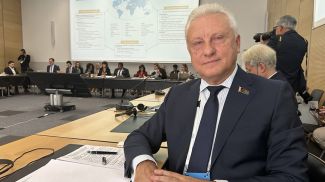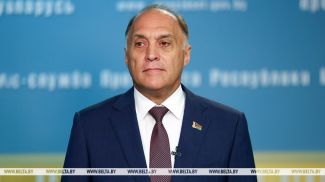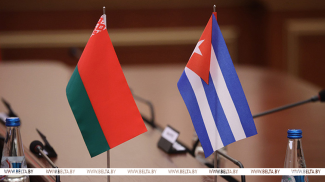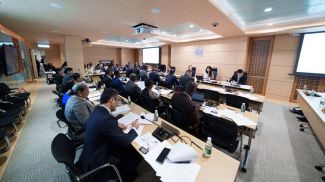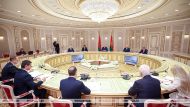MINSK, 15 April (BelTA) – A Belarusian parliament delegation led by Chairwoman of the Council of the Republic of the National Assembly of Belarus Natalya Kochanova has taken part in the international parliamentary conference “Global challenges and threats amid the COVID-19 pandemic. Terrorism and violent extremism”, BelTA has learned. The video conference was organized by the Interparliamentary Assembly of the Commonwealth of Independent States in association with the parliamentary assemblies of the Organization for Security and Cooperation in Europe (OSCE), the Council of Europe, the Mediterranean, and the United Nations Counter-Terrorism Office.
Chairman of the Council of Heads of Security Agencies and Special Services of the CIS member states, Director of the Federal Security Service of Russia Aleksandr Bortnikov, President of the Parliamentary Assembly of the Council of Europe Rik Daems, heads of the parliaments of Azerbaijan, Moldova, Uzbekistan, heads of counter-terrorism agencies of the United Nations Organization, the Commonwealth of Independent States, and other people made speeches during the plenary session of the conference.
In her speech Natalya Kochanova talked about challenges and threats amid the pandemic. She mentioned Belarus' initiative in favor of launching a global dialogue on security and the latest innovations in the Belarusian legislation in the sphere of national security and public order.
According to Natalya Kochanova, the pandemic is a major global problem at the current stage of development of the humankind. The pandemic puts forward complex and constantly changing challenges and threats that affect virtually all the spheres of politics, economy, and public life. The spread of the virus has catalyzed the growth of terrorist and extremist manifestations. She mentioned isolation, closure of borders, lockdowns and the resulting reduction of funding available for counter-terrorism efforts, for financing joint security-related projects and aid. “The realization of peacemaking and humanitarian initiatives has slowed down. Extremists and radicals use the pandemic to spark hatred and destabilize the public and political situation. The pandemic has had an effect on approaches in international relations. Unfortunately, economic sanctions, double standards, information aggression, history falsification, color revolutions, and hybrid wars are becoming part of our lives,” she noted.
Natalya Kochanova added that Belarus felt it in full measure in summer 2020. “Today Belarus has to deal with a broad range of threats, which used to be unthinkable in the past. Many do not like the stability and the dynamic development of Belarus, its independent domestic and foreign policy. The republic faces brazen economic and political pressure. Unfortunately, legislative bodies and parliamentarians of Western countries as well as interparliamentary organizations play a considerable role in it. Our multiple addresses to foreign colleagues, including European MPs, with suggestions to provide objective information about events in our country have produced no response. Persistent foreign interference with domestic affairs of our country continues. The interference is designed to change the country's constitutional system and the country's policy,” the senator said.
In her words, foreign and domestic ill-wishers are trying to isolate the Belarusian state on the international scale. “But despite that our interparliamentary ties with the CIS states, countries of Latin America, Asia, and Africa grow stronger. I am convinced that only an equal dialogue and mutual respect will be able to improve mutual understanding and trust. It is necessary to find contact points and ways to reconcile views about the matters nations and countries are worried about in the format of international events like today's forum,” the senator said. “In our country we are doing our best to preserve peace, stability, and independence of the state. Belarusian MPs have become actively involved in efforts to improve the legislation. On a tight schedule and in association with the government agencies concerned a package of bills has been prepared and is being discussed. It includes bills on preventing the rehabilitation of Nazism, on improving criminal laws and labor laws, on arranging mass events, on the operation of law enforcement bodies, on mass media, and on a number of other matters.”
The bill on preventing the rehabilitation of Nazism was put together by Belarusian MPs. It stipulates legal mechanisms for counteracting the glorification of Nazi criminals and their accomplices, a ban on using symbols and attributes of the fascist collaborators, who were involved in the genocide of the Belarusian people. “We have no right to forget our history. The burned-down Khatyn and more than 9,000 other destroyed villages will always remain a symbol of the tragedy of our nation and of the eternal memory about every third Belarusian, who died during the war,” the head of the upper chamber of the Belarusian parliament stated.
The Belarusian side actively uses practices of many countries and is ready to share its experience of lawmaking and law enforcement in matters concerning national security. “No country can defeat terrorism and violent extremism on its own regardless of the country's force potential and cutting-edge technologies. This is why it is so important to maintain a broad international dialogue for the sake of working out approaches to these problems together,” Natalya Kochanova stressed. “The United Nations Organization plays the leading role in arranging this interaction. It is also necessary to advance interaction within the framework of regional international organizations. The Belarusian side is in favor of looking for ways to reduce geopolitical tensions and to establish more constructive international relations. This is why I would like to draw attention of participants of the conference to the Belarus president's initiative in favor of launching a global dialogue on security.”
A number of high-level events have been held in Minsk in order to promote the initiative. An international conference on fighting terrorism using innovative approaches and new and emerging technologies was arranged with assistance of the United Nations Organization. Its distinguishing traits included the recency of the reviewed issues and the unique participation – it was the first time that representatives of OSCE and ASEAN had gathered together. During the conference the Belarusian head of state put forward the initiative in favor of forming a digital good neighborhood belt. “I call upon countries to join this initiative,” Chairwoman of the Council of the Republic of the National Assembly of Belarus Natalya Kochanova noted. “The Commonwealth of Independent States plays a noticeable role in the fight against terrorism. Despite all the problems and hardships our countries encountered last year the CIS states continued active interaction in matters of regional security. The development of a system to protect our common information space and step up fight against terrorism is in progress, including by means of creating a common list of terrorist and extremist organizations, which are banned in the territories of the member states.”
Natalya Kochanova thanked Chairwoman of the Federation Council of the Federal Assembly of the Russian Federation Valentina Matviyenko and the secretariat of the CIS Interparliamentary Assembly for organizing the international conference. She continued: “I am convinced that through joint efforts in the spirit of partnership and solidarity we will secure positive results in the counteraction of global challenges and threats, we will ensure peace and tranquility in our countries and in the Commonwealth of Independent States. I wish everyone fruitful work during the conference for the sake of working out new adequate decisions and joint approaches in the fight against terrorism and violent extremism,” she concluded.
During the conference panel sessions were held to discuss legal mechanisms of international cooperation in counteracting terrorism and violent extremism; evaluate the threat of terrorism and efforts to prevent violent extremism; encourage and protect rights of terrorism victims and satisfy their needs; discuss democracy in the face of the COVID-19 pandemic.
The 52nd plenary session of the CIS Interparliamentary Assembly will take place on 16 April. The legislative regulation of migration processes amid the pandemic and the role of CIS parliaments in the process will be high on the agenda. The MPs will discuss the model CIS Migration Code the CIS Interparliamentary Assembly has prepared.
Chairman of the International Affairs and National Security Commission of the Council of the Republic of the National Assembly of Belarus Sergei Rachkov noted that the Belarusian delegation will inform CIS MPs about the priorities of Belarus' CIS presidency. “As you know, Belarus presides over the Commonwealth of Independent States in 2021. It is a very honorable and responsible mission for us because this year we will celebrate the 30th anniversary of the foundation of the Commonwealth of Independent States. This is why we will very thoroughly discuss the goals, tasks, and tools we will use and are already using this year in the CIS. During the plenary session the head of our delegation is expected to make a speech on migration amid the pandemic. You know the difficulties the coronavirus pandemic has caused in this area and the efforts our country exercises. Among other things we actively helped neighbors – the friendly Ukrainian nation – when there was a certain influx of population from that country to Belarus. We enabled the necessary favorable conditions to accommodate Ukrainians. On the whole, the agenda is quite large, very intensive, and involves most impressing issues. The Belarusian side will present its stance on most of them,” the senator added.




